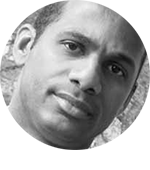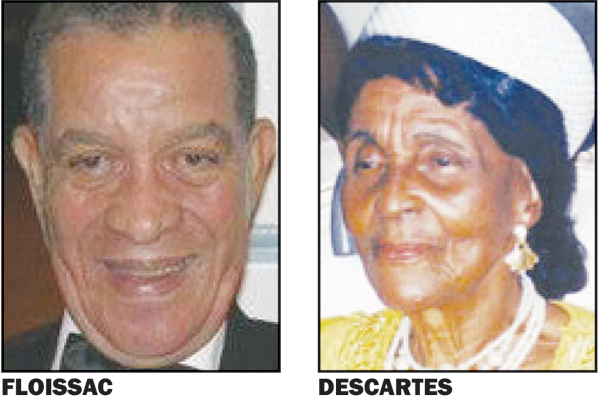
“WE are gathered here today to remember Hunter J. Francois, and the invaluable contributions he made to education and the arts. It is fitting that we do so, for it is important that he be remembered as a national hero.” Sounds discombobulatingly familiar, doesn’t it?
And while I’m at it, with no irony intended, let me use the opportunity to pay homage to George Odlum, Jeff “Pelay” Elva, Sir John Compton, Sir Stanislaus James, Heraldine Rock, Sesenne Descartes, Sir Vincent Floissac, HilfordDeterville and the list goes on and on. These illustrious men and women were people of great consequence and stature, and served as role models to our kids, and will continue to project an image of perseverance and greatness to future generations. Forgive me, dear reader, if I raised an issue that most of you don’t really seem to care about, but I will persist nonetheless in my quest to find answers to the question of how the lives of our national heroes should and can be celebrated, and what should those fallen heroes have done themselves to ensure that their legacies were not forgotten by a society that seems to have an incredibly short memory and a detached sense of loyalty and patriotism.
Every national hero, whether still alive or deceased, has hada unique and fascinating story to tell. Human and societal culture is made richer by the contributions of these heroes both in deed and through a written recollection of challenges, ambitions and tribulations; skilfully interweaving the personal and the historical. Tales of political redemption, cultural nostalgia and daunting adversity can serve our society a useful contemplative purpose. A written, systematic account of a luminary’s personal and professional life has the inspirational gravitas to contribute to making our people somewhat more conscientious and imaginative, and finding solutions to personal and community problems. Moreover, it adds to the knowledge capital of a society and may help leaders find their strategic composure and motivational impetus in their various organizations and institutions.
An autobiography covers an entire life from birth to the present. In a small society like ours, the challenge we face is the effort to encourage distinguished individuals to give and show more of themselves for the good of our whole society. How do we make connections between the profoundly local and individual on the one hand, and the global and world historical on the other hand? It would be fair to say that the more talented, famous, accomplished or successful a person is, the more interesting their life story will be. However, everyone has a unique set of experiences and circumstances that can make for a highly entertaining and worthwhile autobiography or memoir.
Think of all the uplifting and amazing stories that some of our heroes could have told if only profound interest and resolute persistence had been shown for their national contributions and life trajectories. Unfortunately, I have the impression that a lot of history has been allowed to go unheeded and undocumented owing to a national disposition of indolence and indifference. We don’t seem to care about the past and live only for the present. The characterization “dead heroes’ society” aptly fits St. Lucia.
Although many observers decry and bemoan both the decline in reading habits and intellectual curiosity in our country, our intellectuals themselves haven’t produced the kind of autobiographic material necessary to assist in the documentation of their achievements or that of other outstanding sons and daughters of the soil. We live in a nation where “research” and “investigative journalism” seemed to have escaped our attention a long time ago. Public discussion of the benefits of cultural and political memoirs has been lamentably lacking, if not non-existent.
Preserving social, cultural and political history (and writing it well so that it resonates with others) is a wonderful thing for posterity. Some of our great sons and daughters will sadly not belong to posterity as instructors of future generations in the principles of steadfastness, success and perseverance. They may have read poems composed in their honour, read histories of their achievements, but never produced anything to communicate their desires, visions and aspirations. The only real question is whether or not our behaviours are leading towards creating an unliveable intellectual and civil environment for our posterity.
I don’t wish to belabour the point, but our heroes are dying without leaving any official account of their achievements, and thereby impoverishing our quality of life both present and future. How many people in this country even knew that Hunter J. Francois was still alive until his passing recently? In a civil and progressive society, social life is not only about living, but also about having something tangible to remind us of the trials and tribulations of national heroes. It pains me to think that the visionary and iconic Sir John Compton, or the erudite and articulate George Odlum shuffled off this mortal coil without leaving a legacy of officially documented ideas and thoughts; a history of their lives written and told by them, even posthumously. Where are the memoirs and autobiographies that these great men should have produced to provide critical perspectives into their lives and indulge the curiosity of young future leaders? Do we really know the true identity and understand the thought processes of these men? I would have certainly been inspired by the memoirs of the brilliant Sir Vincent Floissac or the autobiography of the business savvy Sir J.Q Charles. Both the objective and subjective revelations that would have been contained in these publications would have had societal value and offered a basis for further discourse, something essential for the vibrancy and character of a democracy.
Critical to the development and progress of any society is the need to record experiences and remind future generations of the unfolding of people’s lives and the large or small-scale historical processes associated with them. And what better way to achieve this than through memoirs and autobiographies. St. Lucian intellectuals, statesmen and writers seemed to have failed to recognize the importance and immortal effect of written personal narratives and historical events for generational elucidation. Words were the medium of the life of Frederick Douglas. His most important legacy was the use of words to fight for the freedom and rights of African Americans. He made use of his oratorical and writing skills throughout his life to communicate his desires and ambitions. It is with a certain measure of poignant agony that I say that St. Lucian national leaders need to follow that path and example.
Historians will always find it difficult to write the lives of great men and women. In St. Lucia the sources are often fragmentary if not non-existent. It is sad that very few interviews were conducted to capture the views of some of our national luminaries before they moved on to the great beyond. In an attempt to understand the trajectories of people’s lives before they are gone, the media and the Government Information Service need to pursue a policy and programme of information gathering which can elucidate the life experiences of our cultural and political heroes, how they view or viewed the world and why they viewed the world in the way they did. We need to start locating the plausible social, economic, political and cultural contexts in which our society has evolved and the thought processes that have sustained us. It is mostly through personal historical documentation that prominent and successful people relate their triumphs, failures and hardships.
Autobiographies and memoirs frequently serve as role models for our people by presenting the author’s most outstanding achievements, stories about their childhood, obstacles they had to overcome, the results of their work or accomplishments, how the society will be different, what it is like to be them, what satisfied them about their accomplishments and what the general or specific direction should be.
Furthermore, autobiographies and memoirs written by statesmen and cultural figures tend to serve as instruments of empowerment and social responsibility.
Ray Bradbury in Fahrenheit 451 opined that “Everyone must leave something behind when he dies . . . Something your hand touched some way so your soul has somewhere to go when you die . . . It doesn’t matter what you do, so long as you change something from the way it was before you touched it into something that’s like you after you take your hands away.”
I dread the day when our grandchildren will ask what it was like “back in the days of Sir Allen Lewis” and we’ll have nothing to tell them or no publication to make reference to.
For comments, write to Clementwulf@hotmail.com – Clement Wulf-Soulage is a Business Economist and Author.






![Simón Bolívar - Liberator of the Americas [Photo credit: Venezuelan Embassy]](https://thevoiceslu.com/wp-content/uploads/2025/12/Simon-Bolivar-feat-2-380x250.jpg)



